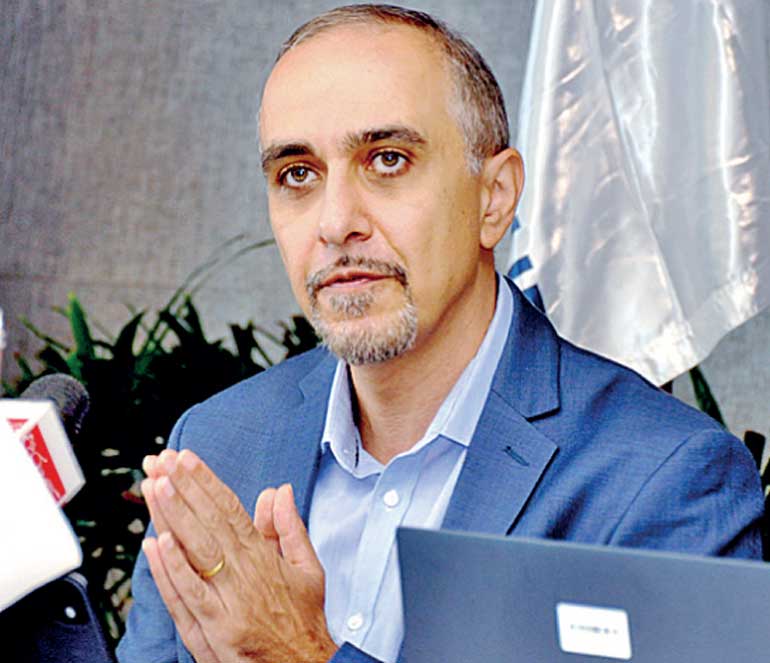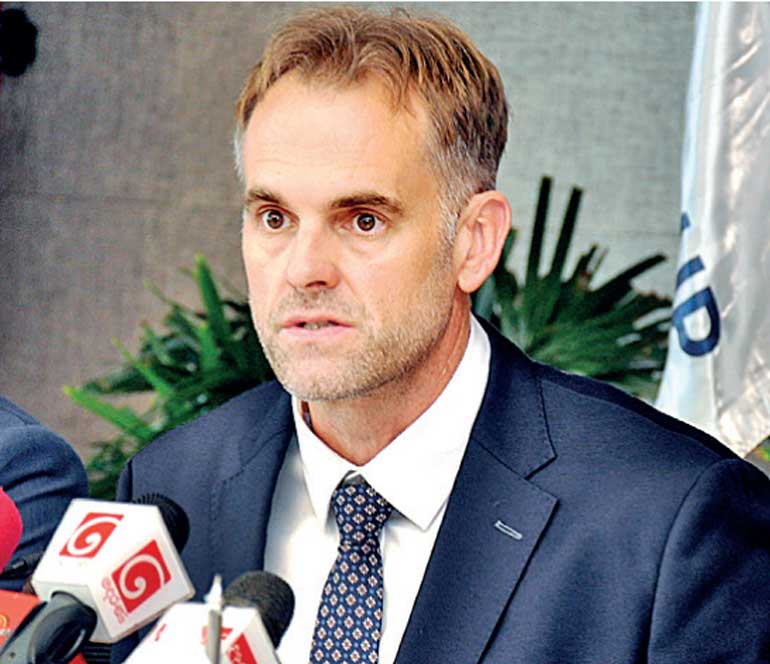Monday Feb 23, 2026
Monday Feb 23, 2026
Friday, 11 October 2024 00:00 - - {{hitsCtrl.values.hits}}

World Bank Country Manager for Sri Lanka and Maldives Gevorg Sargsyan

World Bank Country Economist for Sri Lanka Shruti Lakhtakia

World Bank Senior Country Economist for Sri Lanka Richard Walker
By Charumini de Silva
The World Bank yesterday announced that Sri Lanka’s economy has shown signs of stabilisation, projecting growth to surpass the earlier estimate of 2.2% now expected to reach 4.4% in 2024.
This positive outlook follows four consecutive quarters of growth, primarily driven by the industrial and tourism sectors.
The findings were part of the multilateral donor’s bi-annual report, ‘Sri Lanka Development Update: Opening up to the Future’, released yesterday. Although the forecast is promising, the World Bank warned that the recovery still remains fragile and hinges on maintaining macroeconomic stability, successfully restructuring debt and continuing structural reforms to increase medium-term growth and efforts to reduce poverty.
The report underscores Sri Lanka’s untapped export potential estimated at $ 10 billion annually and could generate around 142,500 new jobs if properly leveraged. It emphasised the importance of diversifying exports across manufacturing, services, agriculture and implementing necessary reforms to unlock this potential.
Despite expected gradual improvements, poverty levels are predicted to remain above 20% till 2026, while inflation is anticipated to stay below Central Bank’s target of 5% in 2024, before gradually increasing as demand picks up. Tourism and remittances are expected to keep the Current Account surplus through 2024. It projects Sri Lanka’s economy to grow at a more modest pace of 3.5% in 2025, as a result of the adverse impacts of the economic crisis.
The report highlighted the need for crucial reforms aimed at boosting exports, attracting foreign investment, enhancing female labour force participation, improving productivity, and addressing challenges such as poverty, food insecurity, and vulnerabilities in the financial sector are crucial for achieving more inclusive and sustainable growth.
Speaking at the report launch, World Bank Country Manager for Sri Lanka and Maldives Gevorg Sargsyan noted that while the country has made faster-than-expected progress in overcoming its economic crisis, the recovery is still in the early stages.
“The good news is that after a very painful economic crisis, Sri Lanka transitioned at a faster pace than expected. The not-so-good news is that the country is not yet out of the woods,” he added.
He also highlighted the severe social consequences of the crisis which saw the poverty rate spike to over 25%, leaving one in four Sri Lankans living below the poverty line. He said the crisis also heavily impacted human development, health, education, and social protection sectors.
Sargsyan stressed the need for hard work and consistent policies to overcome the challenges. “Exports are one of the biggest areas for Sri Lanka to grow. There is an opening for Sri Lanka to deepen its participation in the reshaped global value chains and take advantage of its geographical location. Sustainable growth is the biggest part of the solution to generate jobs and sustain growth,” he said.
To unlock the $ 10 billion annual export potential, Sargsyan called for the removal of bureaucratic obstacles and the creation of a level playing field for domestic and foreign investors to boost investments.
In a detailed presentation, World Bank Country Economist for Sri Lanka Shruti Lakhtakia pointed to the positive economic turnaround seen over the past four quarters, primarily driven by the industrial growth and strong rebound in tourism-related services such as accommodation, food and transportation.
However, she cautioned that domestic consumption remains sluggish with much of the recovery being externally driven by demand and investment.
Lakhtakia also noted that despite improvements in the financial sector such as the Central Bank’s reduction of policy rates, which increased bank profitability, challenges remain. “Specifically, lending growth has been insufficient to fully support economic recovery and issues of credit quality still need to be addressed,” she asserted.
On the fiscal front, Lakhtakia pointed to the improved revenue collections due to change in tax policies. However, she highlighted the reliance on indirect taxes such as VAT, which continues to disproportionately burden low-income households. Lakhtakia underscored the importance of continued policy consistency and structural reforms, noting that Sri Lanka’s path to stability remains narrow, with downside risks heightened by limited financial buffers.
World Bank Senior Country Economist for Sri Lanka Richard Walker stressed that policy consistency is vital to safeguarding hard-won economic gains. He recommended a focus on addressing poverty, improving the targeting of cash transfers and fertiliser subsidies and adopting more progressive revenue mobilisation measures.
He also stressed the importance of resolving longstanding structural weaknesses, enhancing competitiveness and addressing the root causes of Sri Lanka’s economic crisis.
Elaborating on the untapped export potential of $ 10 billion per year, he claimed that Sri Lanka has become more inward oriented.
“Almost half of the potential exports are now missing and most of the missing exports are in Asia,” he added.
Walker recommended reducing tariffs and simplifying the tariff structure to encourage exports, improve access to imported inputs and increase efficiency through measures like removing para-tariffs, prioritising key inputs for exports, increase coverage of schemes to reduce tariff burden on exports especially for SMEs.
“Sri Lanka’s FDI has been below aspiration peers and Low and Middle Income Countries (LMIC) average despite the substantial tax expectations granted,” he said, asserting the importance of targeting export-oriented FDIs.
He suggested that the country should focus on enabling environment and better governance, operationalise the Economic Commission chapter of the ETA, remove restrictions on FDI in trade enhancing services such as transport and logistics and negotiate deep FTAs with provisions to attract FDIs and improve trade facilitation.